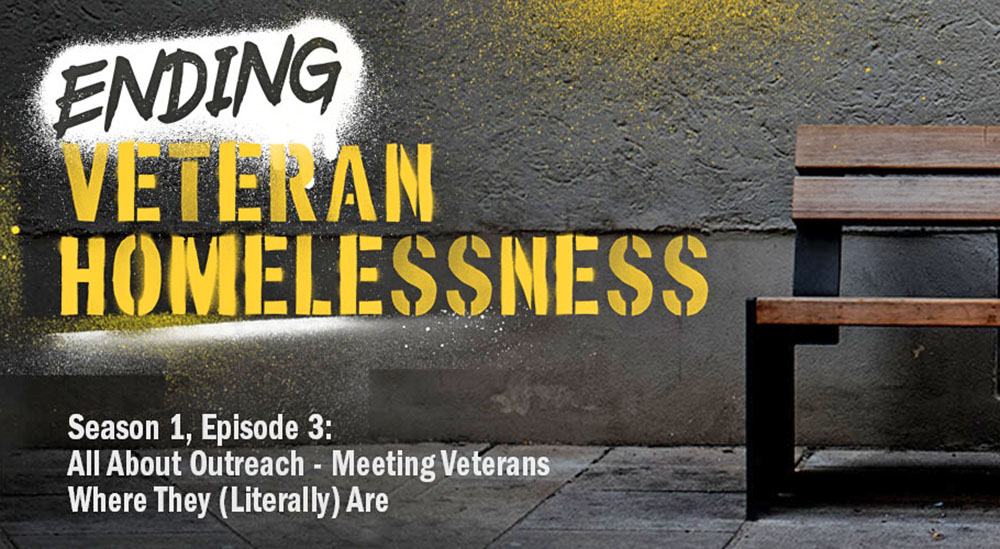Picture this: As you are driving, you notice on the side of the road, a person holding a cardboard sign that reads, “Homeless Veteran, anything helps.”
The scenario is easy to imagine but knowing how to help is not always as clear.
Fortunately, there are several ways we can all help Veterans who might be in this situation. Tune into this month’s episode of the Ending Veteran Homelessness podcast as Eileen Devine, national director for Health Care for Homeless Veterans, discusses the power of outreach.
Listen to “S1EP3: All About Outreach – Meeting Veterans Where They (Literally) Are” on Spreaker.
A Devine intervention
When Eileen Devine was a social work graduate student, she had the opportunity to complete her practicum work at the Portland VA Medical Center. She believed so strongly in the work she was doing that she did not want to stop after graduating.
“Fast forward about 20 years and here I am, still loving working in the system and working with Veterans,” Devine says.
Serving Veterans across various inpatient and outpatient settings within VA has provided Devine with a thorough understanding of the circumstances that cause homelessness for many Veterans. Yet, Devine’s reputation as a changemaker for Veterans stems from a more fundamental understanding that we each have a responsibility to help each other.
“Outreach is the backbone of our program.”
Devine helps thousands of Veterans and their families every day in her role. She describes outreach as the “backbone” of Health Care for Homeless Veterans.
The program’s team of clinical social workers and peer support specialists go into the community to find Veterans who might not be aware of VA’s services. Many are unsure how to access VA’s help or are hesitant to accept help.
Some members of the team are Veterans who have experienced homelessness themselves.
Empathy and dignity are the cornerstones of every interaction. The team understands that an individual might be experiencing homelessness for a variety of reasons. Their experience may involve significant trauma. Devine says they ask Veterans, “What is your story? What has happened to you?”
In addition to individual outreach, Health Care for Homeless Veterans conducts outreach at the community level through:
- Hosting Stand Downs: One- to three-day events during which VA staff and volunteers provide food, clothing and health screenings and referrals to homeless and at-risk Veterans.
- Operating Community Resource and Referral Centers: These are known as “one-stop shops” for Veterans to receive housing and health care services in areas with high concentrations of Veterans experiencing homelessness around America.
- Coordinating entry efforts between VA and existing community programs to ensure Veterans receive the comprehensive care and resources they deserve.
Devine describes the teamwork that occurs between VA and community organizations as a powerful catalyst for change. She says, “If we work together, we’re going to be able to accomplish more.”
How you can help
The next time you see a Veteran experiencing homelessness, what can you do to help?
“I would encourage you to begin looking at your own community and the agencies that serve homeless individuals. And just picking up the phone and calling them and asking them, ‘What are some ways I can help? What is the best use of my time?” says Devine. “They can tell you exactly what’s going on in that community, where they need people, where they need resources. And then you can begin there.”
To begin helping Veterans in your community today:
- Find your nearest VA: https://www.va.gov/find-locations.
- Learn more about VA resources to help homeless Veterans: https://www.va.gov/homeless.
- Participate in a Stand Down near you: https://www.va.gov/homeless/events.asp
Topics in this story
More Stories
Study underscores important role COVID vaccination can have in protecting Veterans from infection and reducing long-term health consequences
Columbia VA’s robotic surgery teams completed their 800th robotic surgery and are on schedule to hit 1,000 by the end of the year.
In a decentralized clinical trial, Veterans can participate from their own homes or local VA instead of having to travel to a research site.






